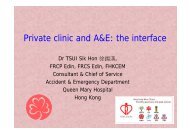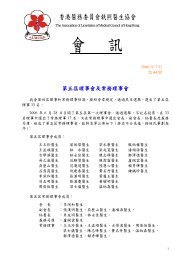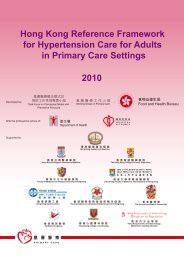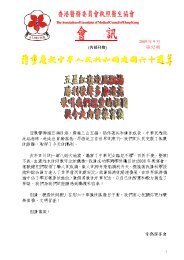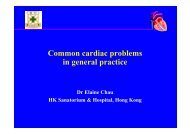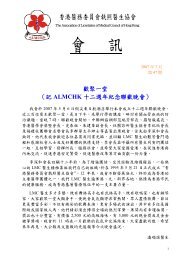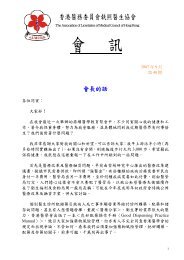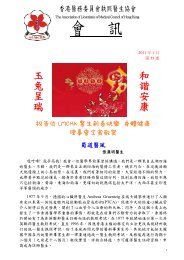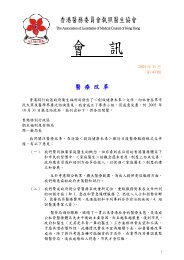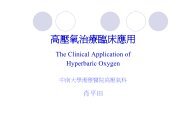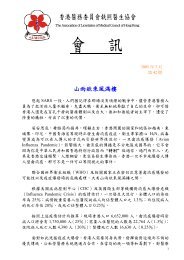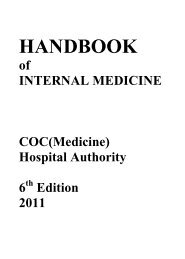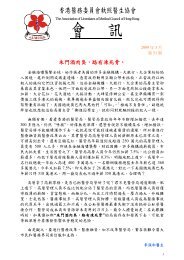UPDATES ON MANAGEMENT OF IRRITABLE BOWEL SYNDROME
UPDATES ON MANAGEMENT OF IRRITABLE BOWEL SYNDROME
UPDATES ON MANAGEMENT OF IRRITABLE BOWEL SYNDROME
Create successful ePaper yourself
Turn your PDF publications into a flip-book with our unique Google optimized e-Paper software.
<strong>UPDATES</strong> <strong>ON</strong> <strong>MANAGEMENT</strong> <strong>OF</strong><strong>IRRITABLE</strong> <strong>BOWEL</strong> <strong>SYNDROME</strong>Dr. Cheung Wing Lin KentSpecialist in Gastroenterology and HepatologyMBBSFHKCPMRCP(UK)FHKAM(medicine)
• Epidermiology• Diagnosis• Pathophysiology• Management
Prevalence• Common GI condition• More common in western countries• ~ 10‐15% in North America• ~ 11.5 % in Europe• F : M 2:1• Younger patients and women are more likely to bediagnosed• Majority do not seek medical attention
World map of IBS prevalence (2000–2004) based on the Rome II and III criteria(figures for the Manning criteria in brackets where available )• Impact on patients• Impact on physicians• Economic impactIrritable bowel syndrome in developing countries‐‐a disorder ofcivilization or colonization? Neurogastroenterol Motil. 2005
Prevalence in HK• Hong Kong 1000 successful telephone interview (56% ) Standardized questionaire August 2000 – December 2000 Rome II criteria 12‐month prevalence was 6.6% F:M 1.3:1 IBS–D 27% , IBS‐C 17% , IBS‐M 56% 47% with IBS sought medical attention Only 21% of IBS subjects given diagnosesPrevalence of irritable bowel syndrome in Hong Kong.Journal of gastroenterology and Hepatology 2002
Impact• Personal impact Poorer quality of life ~ 1/3 experience extremely or severe abdominal pain >2/3 miss 1 activity per week > 50% substantial impact on social activities 52% negatively affected their sex life or physicalrelationshipsThe Burden of Illness of Irritable Bowel Syndrome: CurrentChallenges and Hope for the Future www.amcp.org 2004
Impact• Direct cost Prescription and OTC drug costs• Indirect cost Loss of productivity 1 survey (n= 1597)• 12% give up work• 35% employee lost job due to IBS• 32% being stopped from applying for promotion or anew jobImpact of irritable bowel syndrome on personal relationshipsand working practices. Eur J Gastroenterol Hepatol. 2001
Characteristics• Chronic condition• Functional disorders• Experienced by every one over a life time• Stress / anxiety / difficulty in concentration• Common associated disorderGERDFunctional dyspepsiaFibromyalgiaTension headacheGeneral anxiety disorder
Clinical manifestations• Othersbelching ,heartburn, dyspepsia , nausea
Presentation• Recurrent diarrhea• Recurrent attacks of abdominal pain• Constipation with abdominal pain• Persistent bowel symptoms after episode ofacute GE
DIAGNOSIS
Diagnosis• No clear diagnostic biomarkers• ? by exclusion• Symptoms based criteria x high likelihood of IBS Manning (1978 )• conflicting data regarding predictive ability Rome I (1990 ), Rome II (1999) , Rome III (2007)• revised by international working team for standardization of diagnosis
Manning criteria• > 3 of the following features:Onset of pain linked to more frequent bowel movementsLooser stools associated with onset of painPain relieved by passage of stoolNoticeable abdominal bloatingSensation of incomplete evacuation more than 25% of the timeDiarrhea with mucus more than 25% of the time• Pooled sensitivity : 78% Specificity 72%
Rome III Criteria• Recurrent abdominal pain or discomfort** at least 3days/month in the last 3 months associated with >= 2of the following: Improvement with defecation Onset associated with a change in frequency of stool Onset associated with a change in form (appearance)of stool• Criterion fulfilled for the last 3 months withsymptom onset at least 6 months prior to diagnosis** “Discomfort” means an uncomfortable sensation not described as pain.
Symptom‐based diagnosticcriteriaLimitations• Only 1 study on accuracy of Rome I Sensitivity 71% , specificity 85%• None on Rome II or III – need validation• No ideal diagnostic criteria
Red Flags• Age >50• Rectal bleeding• Weight loss• Recurrent fever• Family history of Ca colon / inflammatory bowel disease• Chronic severe diarrhoea• Abnormal physical findings ( malabsorption , pallor )
How alarming ?SensitivitySpecificityWeight loss 22% 89%Anaemia 19% 90%RectalBleeding64% 52%• Increased risk if positive family history of colorectalcancer, celiac disease or IBD• If alarming features excluded, Rome I specificity 98%
Pretest probability of organic GI disease inpatients meeting symptom‐based criteria for IBS
Diagnosis• Consensus statement issued by American College ofGastroenterology (ACG) :Routine diagnostic testing with complete blood count, serumchemistries, thyroid function studies, stool for ova and parasites,and abdominal imaging is not recommended in patients withtypical IBS symptoms and no alarm features because of a lowlikelihood of uncovering organic diseaseDiagnosis of IBS should be made by identification of positivesymptoms consistent with conditions summarized by Romecriteria and excluding in a cost‐effective manner other conditionswith similar clinical presentations
Who needs colonoscopy ?• ACG recommendation :Colonoscopic imaging should be performed in IBS patientswith alarm features to rule out organic diseases and inthose over the age of 50 years for the purpose of colorectalcancer screening.
Emerging specific Investigations• Celiac disease Tissue transglutaminase antibody (TTGA) Capsule endoscopy• Lactose intolerance lactose breath test• Small intestine bacterial overgrowth lactose breath test• Visceral hypersensitivity faecal serine protease activity• Microscopic colitis Random colonic biopsy
Classifications• Constipation–predominant IBS ( IBS –C ) hard or lumpy stools ≥25 percent / loose or watery stools
PATHOPHYSIOLOGY
Pathophysiology• Poorly understood, likely multifactorial• Proposed mechanismsGenetic predispositionAltered motilityVisceral afferent hypersensitivity& brain‐gut interactionsMucosal inflammationAlteration in fecal microfloraEmotional stressConflicting results
Genetic predisposition• Similar symptoms tends to run in family• Differences in inherited patterns of serotoninprocessing at the neuronal level• Study suggested that IBS is more common inpatients who have a first degree relatives whohas IBS symptoms• Another study showed that IBS is more commonin monozygotic than dizygotic twins, butpresence of a parent who had IBS was even morepredicitve for subsequent development of IBS
Gastrointestinal Motility• Numberous motility abnormalities were shown in IBS patients,including:altered colonic transit times, frequency of colonic contractions, rectalcompliance, rectal accomodationaccelerated motility responses to various stressors such as meals, mentalstress• Conflicting results, primary vs secondary ??• No predominant patterns of motor activity has emerged asmarkerAsian motility studies in irritable bowel syndrome.J Neurogastroenterol Motil. 2010
Visceral Hypersensitivity andBrain‐gut Interactions• Perception in the GI tract results from stimulation of variouschemoreceptors and mechanoreceptors in the gut wall.Enhanced perception of visceral stimuli leads to abdominalpain• Abnormalities in brain‐gut (CNS‐ENS ) axisDysmodulationAltered biochemical axisRecent work using PET scan and functional MRI identifiedabnormalities in brain activation in patients who had IBS versuscontrols• Evolving evidence has implicated several neuromodulators,including serotonin, in the normal function of ENS
Mucosal Inflammation• Up to 1/3 of individuals suffered with bacterial enteritisgo on to develop more chronic GI symptoms• 10 to 30 % of patients after acute GE• Low grade inflammation• Change in gut immune system : increase in enteroendocrinecells, T lymphocytes, and gut permeability• Microscopic inflammationIncrease lymphocytic infiltration in myenteric plexusActivated mast cells infiltration• Role remains unclear, only small number of patientsstudiedPostinfectious irritable bowel syndrome--a meta-analysis. Am J Gastroenterol 2006
Small Intestine BacterialOvergrowth• Small intestine bacterial overgrowth (SIBO) 78‐84% IBS patients had abnormal hydrogen breath test (20% incontrol group ) in 2 provocational studies 50% no longer met Rome criteria after eradication with neomycin• Much lower prevalence of SIBO in other studies• Contributing role remains controversial
Psychological Dysfunction• Psychiatric disorders, especially major depression,anxiety, and somatoform disorders, occur in up to 94%• High association non‐GI somatic disordersSystematic review of the comorbidity of irritable bowel syndrome withother disorders: What are the causes and implications?Gastroenterology 2002
Psychological Dysfunction• Not etiologic but plays important role in modulating IBS patients with IBS symptoms who do not seekmedical attention are indistinguishablepsychologically from healthy controls• Combined psychology and physiology can influence thesymptoms and outcome
<strong>MANAGEMENT</strong>
General PrincipleNon pharmacologicalTherapeutic relationshipPatient educationDietary modificationPsychosocial therapiesAcupuncturePharmacologicalAbdominal painDiarrheaConstipation• Based on guidelines /consensus opinions• Few proven benefits
Therapeutic Relationship• Most important• Placebo effects are significant in IBSpatient‐health care provider interaction is the key part
Compare components of placebo effect and patient‐providerinteraction262 patients with IBS3 Groups• Group 1 : waitlist• Group 2 : sham acupuncture + little interaction with HCP• Group 3 : sham acupuncture + much more interactionwith HCPBMJ 2008;336:999-1003 (3 May), doi:10.1136/bmj.39524.439618.25 (published 3 April 2008)
Outcomes at three week follow-upKaptchuk, T. J et al. BMJ 2008;336:999-1003
Outcomes at six week follow-upKaptchuk, T. J et al. BMJ 2008;336:999-1003
Placebo EffectEffective treatment:GOOD doctor‐patient relationship + placebo
Patient Education• Explain about the chronic but benign nature of disease• Validate their symptoms• Set realistic goals• Reassurance
Dietary Modification• To review symptoms pattern related to specific food• Efficacy not well established• Uncertain mechanism
Psychosocial Therapies• Interpersonal psychotherapy• Relaxation therapy and stressmanagement• Cognitive behavioural therapy• Can be considered for motivated patientswho associate symptoms with stressors
Psychosocial therapies• Psychological interventions may be slightlysuperior to usual care or waiting list controlsconditions at the end of treatment althoughthe clinical significance of this is debatable• Possibility of placebo effect• Sustainability of their effects is questionable
Pharmacological treatment• IBS with abdominal pain• IBS with diarrhea• IBS with constipation
IBS WITH ABDOMINAL PAIN
NNT=5(95% CI 4‐9 )
Anti‐depressantsTCA• Postulated mechanisms Antihyperalgesia by blockade of norepinephrine reuptake Slow intestinal transit time ‐> (may exacerbate constipation )• 1 Meta‐analysis 32 RCTs RR of IBS symptoms persisting 0.66, 95% CI 0.57 to 0.78 TCA superior to placebo (NNT –4 , 95% CI3‐8 ) Similar Tx effect with SSRI• S/E : Dry mouth , dizziness ,constipationEfficacy of antidepressants and psychological therapies in irritable bowel syndrome: systematicreview and meta‐analysis. Ford AC; Talley NJ; Schoenfeld PS; Quigley EM; Moayyedi P Gut. 2009
Anti‐depressantsSSRI• Less published experience Paroxetine , Fluoxetine , Citalopram, Sertraline• Result inconsistent• No head to head comparison with TCA• NNT =3.5• GOR :1B
Pain modulatorsAntidepressant Ach 5HT Histamine Dose /effect uptake effect dayTCAsAmitriptyline ++++ +++ ++++ 25‐150mgDoxepin ++ +++ ++++ 25‐150mgDesipramine + +++ + 25‐150mgNortriptyline ++ + ++ 25‐150mgSSRIsCitalopram nil ++++ nil 20mgFluoxetine nil ++++ nil 20mgParoxetine nil ++++ nil 50mgSertraline nil ++++ nil 150mg
Psychosocial TherapiesCBT• Cognitive : to change underlying maladaptivethinking/perception of symptoms• Behavior : to modify dysfunctional behaviors• Best studied psychological therapy• NNT : 2• GOR : 1BHow does cognitive behavior therapy for irritable bowel syndrome work? A mediationalanalysis of a randomized clinical trialLackner JM; Jaccard J; Krasner SS; Katz LA; Gudleski GD; Blanchard EBGastroenterology. 2007 Aug;133(2):433‐44. Epub 2007 May 21.
Summary of Treatment forIBS‐associated Abdominal Pain
IBS WITH DIARRHEA
Antidiarrheal AgentsLoperamide ( Imodium )• 1 SR on 3 RCT All show more effective than placebo for diarrhea Not for other global IBS symptoms Short duration , small no of patients , not standardized• GOR: 2C• NNT : 3‐5
Alosetron• 1 st IBS specific medication approved by FDA• 5HT3 ( serotonin ) receptor antagonists• Modulate visceral afferent activity from the GIT• 1 Meta‐analysis14 RCTsmore effective than the comparators in achieving globalimprovement in IBS symptoms (pooled relative risk, 1.60; 95%confidence interval [CI], 1.49‐1.72; I(2) = 0%) and relief ofabdominal pain and discomfort (pooled relative risk, 1.30; 95% CI,1.22‐1.39; I(2) = 22%)Effects of 5‐hydroxytryptamine (serotonin) type 3 antagonists on symptom relief and constipation in nonconstipated irritablebowel syndrome: a systematic review and meta‐analysis of randomized controlled trials. Clin Gastroenterol Hepatol. 2008
Alosetron• Ischemic colitis (0.1‐1% ) , severe constipation (28% )• Withdrawn from market in Nov 2000• Reintroduce in June 2002 with strict prescribingregulations• Indications :• NNT : 7women with severe diarrhea‐predominant symptoms >6 monthsFail conventional treatment• GOR : 1B
Summary of Treatment forIBS‐associated DiarrheaGOR Benefits S/ELoperamide 2C Diarrhea ConstipationParalytic ileusAlosetron 1B DiarrheaGlobalSevere constipationischemic colitis
IBS WITH C<strong>ON</strong>STIPATI<strong>ON</strong>
FiberNNT: 11(95%CI ,5‐100)
LaxativesLaxatives• Improve constipation, no global improvement• Lack of good evidence• Aggravate abdominal pain / bloating• GOR : 2C• NNT :2‐4
Tegaserod• Only 5HT4 Receptor agonists approved• Stimulates release of neurotransmitter and increasecolonic motility• GOR : 1A• Cardiovascular side effects : angina ,AMI ,CVA• Remove from market since Mar 2007• More selective 5HT4 agonists under investigation
Tegaserod• Adverse events reported significantly more oftenwith tegaserod than with placebo were headache(15% vs. 12%) and diarrhea (9% vs. 4%)• A pooled analysis of data from 29 placebo‐controlledtrials identified 13 ischemic events among 11,614patients treated with tegaserod compared with asingle case among 7,013 placebo‐treated patients.The rate of ischemic events was 0.11% in thetegaserod patients versus 0.01% in the placebogroup• Suspended in US market since 2007
Lubiprostone• Selective C‐2 chloride channel activator• Enhance chloride rich intestinal secretion• FDA approved for treatment of IBS–C since 2008• 2 RCTs 2009 lubiprostone 8 mcg vs. placebo twice daily for 12 weeks Percentage of responders : 17.9% vs. 10.1%, P=0.001 Improve constipation and global symptoms• GOR : 1BClinical trial: lubiprostone in patients with constipation‐associated irritablebowel syndrome‐‐results of two randomized, placebo‐controlled studiesAliment Pharmacol Ther. 2009
Lubiprostone• no comparison with other options oftreatment• Expensive• S/E : nausea(8%),diarrhea(6%),abdominalpain(5%)• Indication : IBS with severe constipation ,failed other approaches
Summary of Treatment forIBS‐associated ConstipationGOR Benefits S/EFiber 2C Constipation Increase bloatingAbdominal painLaxatives 2C Constipation Increase bloatingAbdominal painTegaserod 1A ConstipationGlobalLubiprostone 1B ConstipationGlobalCardiovasculareventsNausea ,DiarrheaAbdominal pain
Management of IBSIBS‐Constipation IBS‐Diarrhea IBS –Abdominal PainMildEducation, reassurance, stress management, and relaxation techniquesFiber, exercise,increased fluid intakeTrial diet excludinglactose and caffeine;other dietary changesModeratelaxativesImodiumAntispasmodic agent,TCASevereTCA, SSRI, psychotherapyLubiprostone Alosetron AlosetronMertz HR. Irritable bowel syndrome. N Engl J Med 2003;349:2142.
Alternative Therapies• Peppermint oil• Probiotics / lactobacillus• Antibiotics• Herbal medicine• Hypnotherapy• Acupuncture• Commonly used• None proven effective inquality trials to date
Emerging therapies
CASE SCENARIOIS IT REALLY IBS?
Ms.Cheung• F/ 33• History of ileal resection >10 years ago, ? Length of ileum resected• Pathology report : non‐specific ileilits• Not on regular medication for long time• C/O chronic diarrhea for years• Loose stool 4‐5 times per day• Associated with mild abdominal discomfort, relieved by defecation• No intermittant constipation• Symptoms partially controlled by imodium• Stool and blood test unremarkable• Colonoscopy performed : NAD
Ms.Cheung• Is it IBS?• Given cholestyramine 2 sachets/ day,diarrhea symptoms much improved• Bile salt malabsorption
Mr.Leung• M/56• Chronic drinker• Abdominal pain for few months• Epigastric pain, sometimes at back• C/O diarrhea especially after fatty meal• Described stool as greasy and difficult to flush• BMI 18.1• Hb 12.5, NcNc, PO4 0.36, mild elevated liver ductal enzymes, amylase125, fasting glucose 8.1• OGD : moderate gastritis• Colonoscopy : normal except internal hemorrhoids
Mr.Leung• Is it IBS?• CT abdomen showed evidence of chronicpancreatitis• Given Creon 1 tab tds with meal diarrhea symptoms improved and patient gainedweight• Chronic pancreatic insufficiency
Points to note• IBS is a prevalent and expensive condition• Symptom–based diagnosis and diagnosis by exclusion• Underlying pathophysiology different for different people,treatment should be individualized• No perfect IBS treatmentEither good evidence but significant side effectsOr good tolerance but efficacy not well establishedPlacebo effect strong and good therapeutic relationship isimportant
Points to note• Red flags for a colonoscopy examination andspecialist referral Weight loss Anemia PR bleeding Family history of colorectal cancer Family history of inflammatory bowel disease Age > 50 Chronic severe diarrhea Recurrent fever
THANK YOU



